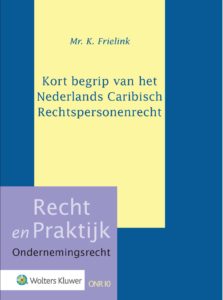NIEUW BOEK CARIBISCH RECHTSPERSONENRECHT
Kort begrip van het Nederlands Caribisch Rechtspersonenrecht
.
Het rechtspersonenrecht in de Caribische delen van het Koninkrijk der Nederlanden heeft de afgelopen jaren een belangrijke ontwikkeling doorgemaakt. Dat geldt in het bijzonder voor Curaçao en Sint Maarten, die sinds 10 oktober 2010 de status van autonoom land binnen het Koninkrijk hebben. In beide landen is bijvoorbeeld een volwaardig enquêterecht ingevoerd, dat direct tot bloei is gekomen. In Aruba staat de invoering …
Read the rest »
OVERZICHT PRIVAATRECHTELIJKE RECHTSPERSONEN
Aruba, Curaçao, St. Maarten en de BES-eilanden
Aruba
Aruba kent de naamloze vennootschap (NV), de Aruba Vrijgestelde Vennootschap (AVV), de Vennootschap met Beperkte Aansprakelijkheid (VBA), de vereniging, de coöperatieve vereniging, de onderlinge waarborgmaatschappij en de stichting. De NV is geregeld in het Wetboek van Koophandel van Aruba en daarin is sedert 1 juli 1988 ook de AVV geregeld. Op 1 januari 2009 is de VBA geïntroduceerd met het van kracht worden van een gelijknamige landsverordening. Bij de VBA is het mogelijk om te kiezen voor een monistisch (one tier) of dualistisch (two tier) bestuursmodel.
De vereniging is geregeld in de …
Read the rest »
HERROEPING ONTBINDINGSBESLUIT RECHTSPERSOON
De Hoge Raad heeft stringente voorwaarden geformuleerd
De Hoge Raad heeft op 9 december 2014 een arrest gewezen (ECLI:NL:HR:2014:3677; JOR 2015/33) dat ook voor het recht van de Caribische (ei)landen van het Koninkrijk relevant is. Op grond van die uitspraak worden de volgende eisen aan herroeping van een ontbindingsbesluit gesteld:
Read the rest »
AANSPRAKELIJKHEID TRUSTBESTUURDER
Geen verlicht aansprakelijkheidsregime
De Landsverordening toezicht trustwezen zegt niets over de aansprakelijkheid van trustkantoren of vertegenwoordigers daarvan die als statutair bestuurder van een rechtspersoon (bijvoorbeeld een NV, BV of stichting) optreden. De vraag is of deze aansprakelijkheid door de gebruikelijke regels op dit vlak wordt beheerst. Omdat het trustkantoor als bestuurder van een rechtspersoon doorgaans een andere rol vervult dan een bestuurder die – zelfstandig – strategische beslissingen neemt, rijst de vraag of voor een trustkantoor mogelijk een lichter aansprakelijkheidsregime geldt.
Recent heeft het Gemeenschappelijk Hof van Justitie een vonnis gewezen naar het recht van St. Maarten waar het betreft …
Read the rest »
SEPARATION BETWEEN LEGAL AND BENEFICIAL OWNERSHIP OF SHARES IN THE DUTCH CARIBBEAN
The beneficial owner of shares is not a shareholder
On March 1, 2004 the act on corporate law (Book 2 Netherlands Antilles Civil Code) became effective. The Act governs NVs (‘public limited liability company’) and BVs (‘private limited liability company’). The main object of the legislator was to provide flexibility and maximum freedom for organization and presentation. Accordingly, the Act contains few mandatory provisions, such as provisions relating to the interests of creditors and minority shareholders.
Concepts like registered, subscribed and contributed capital do not appear in the Act. As a result no minimum capital is required unless such a requirement …
Read the rest »
THE CUSTODY OF SECURITIES IN THE NETHERLANDS CARIBBEAN
Separate legal entity
Generally, securities that must be held by a Netherlands Antilles bank on behalf of its clients will be held by a custodian. In most cases the custodian is either a foundation (‘stichting’) or a wholly owned subsidiary (NV or BV) of the bank.
The scope of the activities of the custodian will be limited to holding shares, bonds, notes, certificates and other securities. The insolvency risk of the custodian is therefore minimized. Alternatively, these securities can also be held in the name of the custodian by independent custody companies abroad, including brokers, agents and sub-custodians. In both …
Read the rest »
CORPORATE PENSION FUNDS IN THE DUTCH CARIBBEAN
Only legal entities may serve as a fund
According to the Netherlands Antilles National Ordinance on Corporate Pension Funds only legal entities may serve as a corporate pension fund. The foundation (‘stichting’) is the legal form most used for these purposes.
The main reason for using a foundation instead of a legal entity of which the equity is divided in shares is that there are no shareholders interest which could conflict with the interest of the participants in the pension fund.
Furthermore, Netherlands Antilles corporate law includes some specific provisions for foundations that are used as a pension fund. Participants …
Read the rest »




